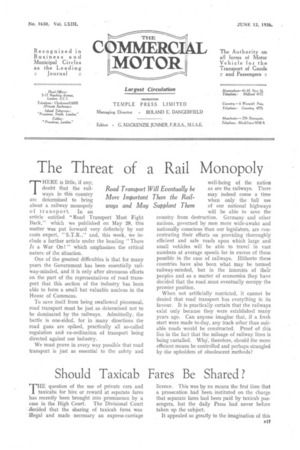The Threat of a Rail Monopoly
Page 35

If you've noticed an error in this article please click here to report it so we can fix it.
IT HERE is little, if any; • doubt that the rail ways in this country are determined to bring about a railway monopoly of transport. In an article entitled "Road Transport Must Fight Back," which we published on May 29, this matter was put forward very definitely by our costs expert, " S.T.R.," and, this week, we include a further article tinder the heading "There Is a War On ! " which emphasizes the critical nature of the situation.
One of the greatest difficulties is that for many years the Government has been essentially railway-minded, and it is only after strenuous efforts on the part of the representatives of road transport •that this section of the industry has been able to form a small but valuable nucleus in the House of Commons.
To save itself from being swallowed piecemeal, road transport must be just as determined not to be dominated by the railways. Admittedly, the battle is one-sided, for in many directions the road guns are spiked, practically all so-called regulation and co-ordination of transport being directed against our industry.
We must prove in every way possible that road transport is just as essential to the safety and well-being of the nation as are the railways. There may indeed come a time when only the full use of our national highways will be able to save the country from destruction. Germany and other nations, governed by men more wide-awake and nationally conscious than our legislators, are concentrating their efforts on providing thoroughly efficient and safe roads upon which large and small vehicles will be able to travel in vast numbers at average speeds far in excess of those possible in the case of railways. Hitherto these countries have also been what may be termed railway-minded, but in the interests of their peoples and as a matter of economics they have decided that the road must eventually occupy the premier position.
When not artificially restricted, it cannot be denied that road transport has everything in its favour. It is practically certain that the railways exist only because they were established many years ago. Can anyone imagine that, if a fresh start were made to-day, any track other than suitable roads would be constructed. Proof of this lies in the fact that the mileage of railway lines is being curtailed. WhY", therefore, should the more efficient means be controlled and perhaps strangled by the upholders of obsolescent methods?




































































































